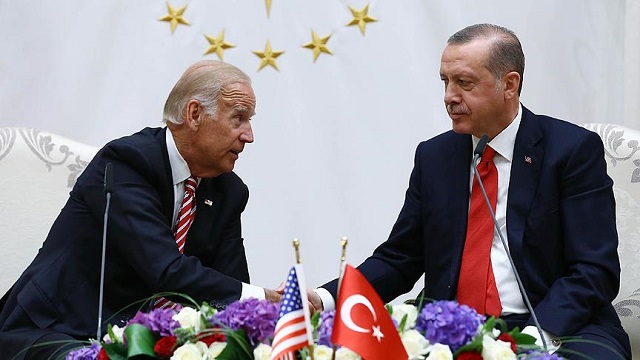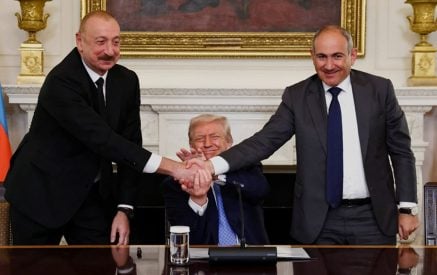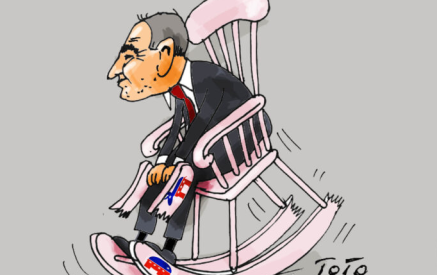The Armenian Weekly. The election for the 46th President of the United States is over. Whether you voted for him or not, Joe Biden is our President. Biden campaigned on a promise to restore the position and integrity of our position in the world. His policy is based on the premise that withdrawing from global forums (WHO, Paris Accords) or avoiding regional instability is not in the long term interests of the United States and global peace. Many, if not all, of the conflicts in the world today are proxy wars. Those tensions take on a different tone, however, when the regional aggressors are dealing with an altered dynamic with the world’s superpowers.
Most analysts will agree that there are three superpowers in our world today: the United States, Russia and China. Many Americans underestimate China’s impact given the historical east/west tensions. As Armenians, we have been traditionally focused on the classic confrontation of Russia and the US. For many decades, it manifested itself through the Cold War where the lines were clear through the “Iron Curtain” of Soviet States and Eastern Europe. With the fall of the Soviet Union in 1991, a political “free for all” took place with NATO expanding into the traditional Russian stronghold of Eastern Europe, while Russia worked to reestablish its hegemony over the former Soviet Union through alliances such as the Collective Security Treaty Organization (CSTO) and Commonwealth of Independent States (CIS). The names changed, but the traditional superpower alignments remained.
While many focus on the head to head tensions it created, it is equally important to recognize that this confrontation has created an important system of checks and balances that limits, when functioning, the instability of the world. While both powers are wary of the other’s motivations, it actually has historically constrained unilateral action. If one party senses a weakness or withdrawal of the other, then the risks increase. The recent history of Syria illustrates this point as the Kurds have once again been abandoned by the west as the latter withdraws from regional conflicts. This dynamic allowed the Russians to negotiate only with regional player Turkey to secure their strategic objective. As a result, Russia has secured a permanent naval and ground position in Syria. The United States, under the previous administration, chose to let the Kurds realign their relationships. Some low profile and covert support remains, but the changes in Syria appear permanent. The Armenians’ sacrifices in Artsakh were unfortunately part of this re-positioning. The Syrian dynamics were secured with the Russian agreement to a joint monitoring in Azerbaijan. This satisfies Turkey’s long term objective to establish a foothold in the Caucasus.
Russia relented for two reasons: their goals in Syria and the unanticipated difficulty of containing Turkey. Turkey has been confident and brash in its aggression. Negotiating was a more practical option than confrontation for Russia. The most significant lesson learned from these recent geopolitical experiences has been the absence or lack of inclusion of the west (United States and Europe). This is the result of a passive policy by the United States and the tradition of strong rhetoric but little action from Europe. Both Turkey and Russia have sensed this and have responded accordingly. Russia was able to successfully manipulate the ending of the Artsakh War by excluding the Minsk Group from the process. Of course, they were publicly invited for the path forward once the elements of the agreement were completed. Does anyone think the Turkish alliance would have attacked Artsakh without a green light from Russia? If not, then Russia is weaker than we thought. Either is a dangerous option for Armenia.
Read also
Turkey has a well known foreign policy of pursuing expansionist activity by bending and breaking the rules. They pursue their objectives until confronted. Once they meet resistance, they move into diplomatic rhetoric while consolidating their positions. Once their adversaries seek stability, the compromise almost always includes a de facto improvement in their position. The absence of “checks and balances” from the west has had a devastating impact. Turkey invaded half of Cyprus in 1974. It is recognized by no one outside of Turkey, yet it has remained a de facto division for almost 47 years. More recently, they have violated the sovereignty of Syria, Libya and Iraq with a military presence. Violating international laws with threats to NATO “ally” Greece in the Aegean and murdering Kurdish Syrians despite their loyal commitment to the US-led alliance are daily occurrences. Playing the west against Russia, they violated NATO principles by purchasing a missile defense system (S-400) from the nation they consider the adversary. The latest criminal behavior has to do with the use of banned weapons in Artsakh, import of jihadist mercenaries into the Caucasus and genocidal complicity, most of it concurrent, unabated and unchecked. Turkey is leading one of the largest criminal sprees conducted by a modern nation hiding under the absurd notion that they are NATO allies and worthy of EU membership. How long will patronizing Europe, salivating over the Turkish economic market and fearful of Islamic migration continue to be manipulated by the fox with no shame?
This is the landscape that President Biden inherits. During his long tenure in the Senate, Biden has a record of supporting the recognition of the Armenian Genocide. We are all familiar with the disappointment of the reneging of the Obama administration pledge of recognition during which time he served as Vice President. In the campaign, Biden was particularly critical of Turkey’s misdeeds and has issued formal policy statements on recognizing the Genocide, relations with Armenia and a just solution on Artsakh. At face value, all of his statements are considered positive towards the Armenian interests. I think it is safe to say that our community remains somewhat divided on the future. Some dismiss the statements as campaign rhetoric as in 2008. Others believe that Biden’s more engaging foreign policy will benefit Armenia. The perception seems to be that a significant plurality is hopeful, but taking a “wait and see” approach. We’ve seen this movie many times.
We are all acutely aware of the argument as Armenians. We should also be looking at our advocacy as Americans. Turkey has run wild with aggressive actions with dangerous implications for regional peace. They have been free to commit unilateral acts of aggression and weakened the position of the United States on the world stage. The Biden administration has stated through his campaign, press statements and the confirmation hearing of Secretary of State Antony Blinken that regaining its traditional position globally as a force of peace is a priority. This certainty has implications with their two major rivals in Russia and China. These relationships are massively complex and impact multiple dimensions. This is a given. I can think of no more immediate example of re-establishing global credibility than by confronting Turkey’s irresponsible behavior.
The fox with no disguise has provided us with numerous opportunities for correction. Re-establishing the rule of international law would be a good starting point. Violating international water laws in the Aegean or the sovereignty of nation states such as Iraq, Syria and Libya are unacceptable in a world that advocates for peace and stability. Criminal behaviors such as the use of illegal weapons and importing of jihadist mercenaries create the type of instability that costs lives and peace. Making a farce of its membership in NATO by undermining allied strategies in Syria and collaborating with Russia on the S-400 missile defense systems is a dangerous precedent that encourages rogue behavior.
Addressing these issues with Turkey would be in the interest of the United States and in particular the stated foreign policy of the Biden administration. The Turks are no fools. They are experts at working with the edges of the rotating policies of the west. While aggression was the policy du jour, we can expect a flavoring of olive branches to quell the impact of the new administration. While the Islamic rhetoric was continuous, Erdogan reaches out to naïve Europe to reignite the worn out EU membership initiative. The tolerance and forgiveness of the west towards reckless Turkey is nauseating. The lure of the Turkish market and military buffer is too tempting. What the west has to realize is that Turkey has crossed the line. The undermining and betrayals are a part of history and policy. It is far past time to respond…with conviction. We cannot protect American interests by patronizing or tolerating Turkey’s criminal human rights abuses. This has resulted in Turkey’s nefarious behavior from North Africa to the Aegean to the Caucasus. The corrections in the Turkish/American relationship will go a long way in promoting stability and peace in currently volatile areas. We should continue to articulate the intersection of the interests of the Armenians and the United States. The argument for justice and morality is honorable, but self interest will rule the day. Turkey’s menacing policies have created a rare opportunity where the victim interests (Armenians, Greeks, Assyrians, Cypriots, Kurds, Arabs and others…the list is incredible in length) and the larger democracies in the west are potentially aligned. We all know that our progress is dependent on the self-interests of the super powers being served. The genocide recognition in Congress was fueled, in large part, by Armenian advocacy coupled with an anti-Turkish and anti-Trump policy window. We are hopeful that new windows will emerge as America re-engages. We feel it is in the best interests of the United States to address the aggression and human rights violations of Turkey as a means of re-establishing its critical role in regional stability.
Stepan Piligian
Photo Caption: VP Joe Biden meeting in Ankara with President Erdogan, July 24, 2016 (Photo: US State Department/Wikimedia Commons)





















































